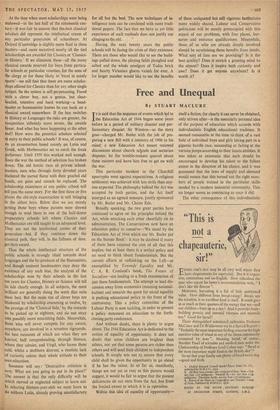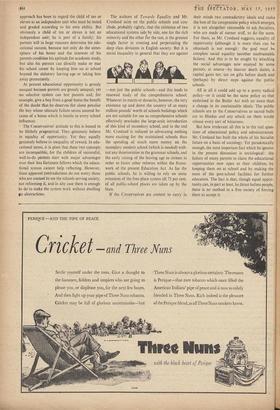Free and Unequal
By STUART MACLURE IT is said that the sequence of events which Ifd to the Education Act of 1944 began some years before in a period of military disaster and par- liamentary disquiet. Sir Winston—so the story goes—charged Mr. Butler with the job of pre- paring a new Bill with a memory of 1906 in his mind; a new Education Act meant renewed discussions about church scljools and sectarian disputes; let the trouble-makers quarrel about these matters and leave him free to get on with' the war.
This particular incident in the Churchill apocrypha went against expectations. A religious settlement was achieved with less strife than any- one expected. The philosophy behind the Act was accepted by both parties, and the Act itself emerged as an agreed measure, jointly sponsored by 'Mr. Butler and Mr. Chuter Ede.
Broadly speaking, the two great parties have continued to agree on the principles behind the Act, while attacking each other cheerfully on its administration. The Conservatives now have an education policy to conserve—We stand by the Education Act of 1944 which our Mr. Butler put on the Statute Book' : it may be doubted if many of them have counted the cost of all that this implies, but at least there is a settled policy and no need to think about fundamentals. But the current efforts at rethinking on the Left—as exemplified by -Towards Equality and Mr. C. A. R. Crosland's book, The Future of Socialism—are leading to a fresh examination of just these fundamentals. The attempt to lead dis- cussion away from economics (meaning national- isation) and towards the quest for social equality is pushing educational policy to the front of the controversy. This a policy committee of the Labour Party is now tackling, in' order to present a policy statement on education to the forth- coming party conference.
And without doubt, there is plenty to argue about. The 1944 Education Act is dedicated to the notion of equality of opportunity. It does not doubt that some children are brighter than• others, nor yet that some parents are richer than others and will send their children to independent schools. It simply sets out to ensure that every child shall be given the opportunity to go ahead if he has the talent. In so far as, manifestly, things are not yet as rosy as this picture would suggest, it would be fair to argue that the present deficiencies do not stem from the Act, but from the limited extent to which it is in operation.
Within this idea of equality of opportunity- itself a fiction, for clearly it can never be obtained, only striven after—is the essentially personal idea of the purpose of education which accords with individualistic English educational tradition. It seemed reasonable at the time to think of a vast field of individual boys and girls taking part in a gigantic hurdle race, succeeding or failing at the various jumps according to their innate abilities. It was taken as axiomatic that each should be encouraged to develop his talent to the fullest extent in the direction of his choice, and it was presumed that the laws of supply and demand would ensure that this turned out the right num- bers of people trained in the particular skills needed by a modern industrial community. This no longer seems as convincing as once it did.
The other consequence of this individualistic approach has been to regard the child of ten or eleven as an independent unit who must be tested and graded according to his own ability. But obviously a child of ten or eleven is not an independent unit; he is part of a family; his parents will in large measure determine his edu- cational success, because not only do the atmo- sphere of his home and the interests of his parents condition his aptitude for academic study, but also his parents can directly make or mar his school career by keeping him on at school beyond the statutory leaving age or taking him away prematurely.
At present educational opportunity is grossly unequal because parents are grossly unequal; yet no selective system can test parents and, for example, give a boy from a good home the benefit of the doubt that. he deserves (let alone penalise the boy whose ultimate failure seems assured be- cause of a home which is hostile to every school influence).
The Conservatives' attitude to this is bound to be blithely pragmatical. They , genuinely believe in equality of opportunity. Yet they equally genuinely believe in inequality of reward. In edu- cational terms, it is plain that these two concepts are incompatible, for the children of successful, well-to-do parents start with major advantages over their less fortunate fellows which the educa- tional system cannot help reflecting. However, these apparent contradictions do not worry those who are content to see the schools serving society, not reforming it and in any case there is enough to do to make the system work without dwelling on abstractions. The authors of Towards Equality and Mr. Crosland seize on the public schools and con- clude, probably rightly, that the existence of two educational systems side by side, one for the rich minority and the other for the rest, is the greatest single factor in creating and perpetuating the deep class divisions in English society. But it is social inequality in general that they are against —not just the public schools—and this leads to renewed study of the comprehensive school. Whatever its merits or demerits, however, the very existence up and down the country of so many million pounds' worth of schools buildings which are not suitable for use as comprehensive schools' effectively precludes the large-scale introduction of this kind of secondary school, and in the end Mr. Crosland is reduced to advocating nothing more exciting for the maintained schools than the spending of much more money on the secondary modern school (which is needed) with- out any deterioration in the grammar schools, and the early raising of the leaving age to sixteen in order to foster other reforms within the frame- work of the present Education Act. As for the public schools, he is willing to rely on some extension of the free-place system till 75 per cent, of all public-school places are taken up by the State.
If the Conservatives are content to carry in their minds two contradictory ideals and make the best of the compromise policy which emerges it is not altogether reasonable to ask Socialists who are made of sterner stuff, to do the same For them, as Mr. Crosland suggests, equality al opportunity (although it is more than can bc obtained) is not enough : the goal must be complete social equality (another unobtainable fiction). And this is to be sought by attacking the social advantages now enjoyed by some parents, at source—by heavier death duties, a capital gains tax, tax on gifts before death and (perhaps) by direct steps against the public schools.
All in all it could add up to a pretty radical policy—or it could be the same policy as that enshrined in the Butler Act with no more than a change in its unattainable ideals. The public schools are to the Conservatives as sacred bulls are to Hindus and any attack on them would release every sort of bitterness.
But how irrelevant all this is to the real ques- tions of educational policy and administration. Mr. Crosland has built the whole of his Socialist future on a basis of sociology. Yet paradoxically enough, the most important fact which he ignores in the present discussion is sociological : the failure of many parents to claim the educational opportunities now open to their children, by keeping them on at school and by making the most of the post-school facilities for further education. The fact is .that, though equal oppor- tunity can, in part at least, be thrust before people, there is no method in a .free society of forcing them to accept it.



































 Previous page
Previous page